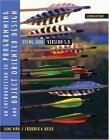
Introduction to Programming and Object-Oriented Design Using Java, 2nd Edition (Java 5.0)
Jaime Nino, Frederick A. Hosch
ISBN: 0-471-71227-2
Book homepage
Amazon link
UMass Textbook Annex, 413-545-3570
CMPSCI 121 provides an introduction in problem solving and computer programming using the programming language Java. It teaches how real-world problems can be solved computationally using the programming constructs and data abstractions of a modern programming language. Concepts and techniques covered include data types, expressions, objects, methods, top-down program design, program testing and debugging, state representation, interactive programs, data abstraction, iteration, interfaces, inheritance, lists and arrays. No previous programming experience required.
Textbook  |
Introduction to Programming and Object-Oriented Design Using Java, 2nd Edition (Java 5.0) Jaime Nino, Frederick A. Hosch ISBN: 0-471-71227-2 Book homepage Amazon link UMass Textbook Annex, 413-545-3570 |
| Weekly Programming (12 of them) (Handed in thru OWL online tutoring system) |
35% |
| Weekly Problem Exercises (12 of them) (Handed in thru OWL online tutoring system) |
10% |
| Weekly Quizzes (12 of them) (Given unpredictably either during lecture or lab) |
5% |
| Midterm Exam | 15% |
| Mini Midterm Exam | 10% |
| Final Exam | 25% |
In addition, to pass the class, you must pass the Final Exam.
The lowest two of the twelve programming assignment grades and two lowest of the twelve problem exercise grades and the lowest three of the twelve quiz grades will be dropped from their respective averages.
(This policy is intended to provide some allowance for sick days or other unavoidable events, not to allow you to skip an assignment you had trouble with. Completion of all 12 assignments will count toward "extra credit," which will be used to adjust letter grades at the end of the semester. The exact effect of extra credit will depend on the final grade distribution.)
As you can see the weekly homework assignments make up the largest single portion of your grade. You learn best by doing, not just listening and reading. Stay on top of the homework, and don't get behind! They come fast--right on top of one another. Keep up with the homework and starting the assignments early. Then: (a) you will have more fun when you aren't under time pressure, and you'll learn more; (b) you will then also understand the lectures better, (c) you will finish the assignment more easily because you will have the context and the support of your peers and TAs, (d) you'll be well on your way to a good grade. It's hard for your instructor, TAs and peers to be sympathetic and helpful to someone who didn't put in the effort to get started before the last minute.
Quizzes are short (less than 10 minutes) tests. Most weeks one quiz wil be given, but some weeks there may be no quiz, followed by two quizzes in a later week. Quizzes will be given unpredictably either during lecture or during lab. In most cases they will occur during the first minutes of the class--so please arrive on time. If you arrive to class or lab late, you will not be allowed to extend your time for finishing the quiz.
You should definitely read the textbook chapters assigned. We have a lot of material to cover--so it is hard to fit it all into 13 lectures. Some material will not be covered in lectures, and you'll be expected to learn it by reading (and asking questions on the bulletin board or in office hours if you are having difficulty.) The quizzes and exams may test material covered in the reading, but not in the lectures or labs. The week's assigned reading should thus be done before the week's lecture, in order to prepare yourself for the quiz.
Homework is assigned during the Lab (aka "Discussion Section") meetings Thursdays at 11:15am, and is due electronically in the OWL system at 9am on Tuesdays. Homework submitted after it is due but 2pm the following day will be accepted, and all problems will be graded with a 30% penalty. Homework submitted after this time will not be accepted (and given a grade of zero), because, in some cases, solution sets will be posted then. As mentioned above, the lowest of the 12 homework assignment grades will be dropped. I encourage you not to "waste" this allowance--it is intended to cover a time when you are sick in the hospital, have a funeral to attend, etc.
If you feel that a homework assignment or exam has been misgraded, you should bring this to the attention of a TA or the instructor. Assignments will be open for regrading for two weeks after their due date, up until the day of the final exam.
Regarding the ethics of what you may or may not discuss with other students:
There may be some "no collaboration" homeworks, or ones in which collaboration with only with a few specific people is allowed.
If the homework writeup states that collaboration is NOT allowed, then:
When in doubt about whether it is ethical to ask or answer a question of another student, ask a TA or the instructor.
Any acts of cheating, plagiarism or breaking the above rules will be reported to the University Academic Honesty Board. You are responsible for knowing, and will be held to, the University Academic Honesty Policy. This policy is available online at http://www.umass.edu/dean_students/rights/acad_honest.htm
If you have questions about these policies please talk with the instructor.